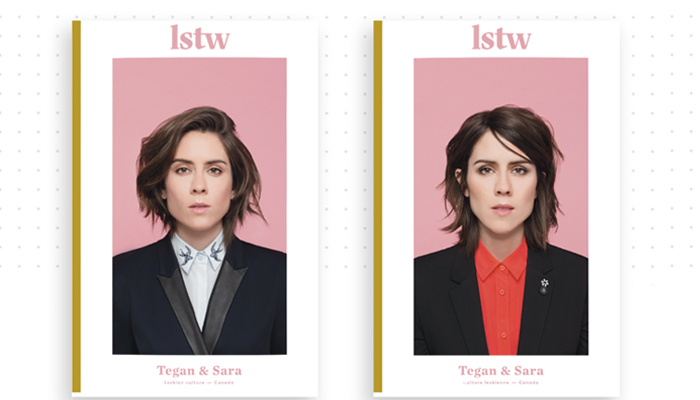Gay and queer men’s alternative publishing has never been the same since since the advent of BUTT magazine in the 2000s. Its pink pages, semi-nude edgy guys and arts-focused editorial became an anchor for a community of queer urban artists, hipsters, punks, and design types, and since then, there has been no shortage of progeny — Hello Mr., Jimmy, Kaiserin, Kink. Most of these “zines” are far from xerography, but rather somewhere between a fashion magazine, an art book and photoerotica.
But until recently, I’d never seen an equivalent publication for queer women, who are perpetually underrepresented in the arts and media across the board. That is, until I attended a seminar at MagNe featuring some of the awesome women behind LSTW, short for Lez Spread the Word. LSTW is a magazine, yes, but it’s also a multimedia project. Founded by Florence Gagnon in 2012, the Montreal-based project has thrown dozens of parties, produced a web series, launched a custom beer, mounted a play and maintained a popular online platform for queer women in Canada and elsewhere. The move to make the first issue of their magazine was only a natural expansion of their community — kind of like the story of BUTT, but inverted.
The mag itself is beautiful, well designed. It’s an upside down mirror image from each, with one half in french and the other in English. Cleverly, it also has two different covers, with one side featuring Tegan and the other side featuring Sara of the legendary Canadian twins/indie duo.
The magazine claims to cover lesbian culture in Canada “From coast to coast to coast,” a mission which is reflected in the wide diversity of their coverage, including an interview with the founder of the Northwest Territories Pride. The articles are wide ranging, spanning such topics as the history of lesbian bars in Montreal, immigration, interior design and dating. They cover so much ground that it will be exciting to see what new ideas pop up for issue two.
That said, there were a few pieces that gave me pause. An article about the police and how to report a hate crime, while perhaps well-intentioned, seems tone-deaf given the strained relationship between the cops and queer and trans people and people of colour. Another article, titled “Seeking Sanctuary,” profiles queer women from countries like Colombia and Cameroon using a logic some might criticize for being homonationalist. Lastly, the profile about queer Arab women in Montreal is moving and insightful, but might rely too heavily on cultural generalizations about Islam and the Middle East. Perhaps in future issues, there will be more room for nuance.
These blind spots don’t bring down the magazine as a whole, and are not unlike the same political issues in similarly well-designed and artsy publications, gay or otherwise. LSTW is an important addition to the genre, and an oasis in a media landscape seriously lacking in lesbian content.
Jonathan Valelly is the incoming editor of Broken Pencil Magazine.

